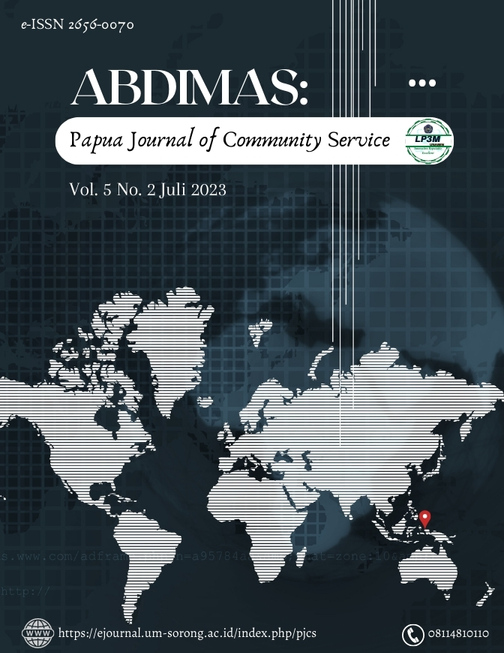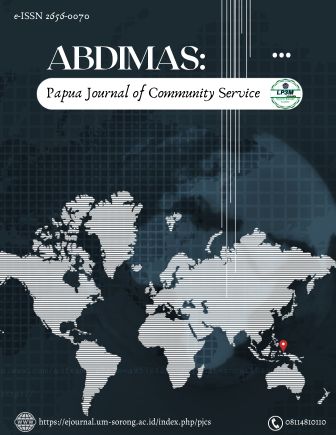Pemberdayaan Narapidana dalam Pembentukan Karakter dan Kemandirian di Lapas Kelas IIA Sorong melalui Pendidikan Kewarganegaraan
Prisoner Empowerment, Character, Independence
DOI:
https://doi.org/10.33506/pjcs.v5i2.2521Keywords:
Bermasyarakat, pemberdayaan narapidana, pendidikan kewarganegaraanAbstract
Empowering inmates is an action taken to help them acquire independence and form positive characters. Citizenship education in prisons is one of the empowerment programs that can help inmates achieve these goals. Citizenship education in prisons is carried out by providing material on the rights and obligations as citizens, as well as national values. Citizenship education provides opportunities for inmates to improve their knowledge, skills, and positive attitudes in community life. The purpose of this research is to determine the effectiveness of empowering inmates through citizenship education in forming character and independence in prisons. The method used in this research is a qualitative method with data collection techniques through interviews, observation, and documentary studies. The results showed that citizenship education provided in prisons has a positive influence on the formation of character and independence of inmates. Inmates who participate in citizenship education programs in prisons have knowledge, skills, and positive attitudes that can help them in community life after being released from prison. Therefore, citizenship education in prisons needs to be continuously improved and expanded to achieve more effective inmate empowerment goals.
References
Halik, W., Kelibay, I., Refra, M. S., Purnomo, A., & Fikri, A. (2022). Sosialisasi Peran Aparat Kampung Dalam Pemberdayaan Masyarakat Di Kampung Teluk Dore Distrik Makbon Kabupaten Sorong. Jurnal Abdimas Resoku, 1(1).
Kementerian Hukum dan HAM. (2015). Pedoman Pelaksanaan Pendidikan dan Pelatihan di Lembaga Pemasyarakatan. Jakarta: Kementerian Hukum dan HAM
Pramono, R. (2017). Pemberdayaan narapidana melalui pembelajaran kewarganegaraan untuk mewujudkan pembentukan karakter dan kemandirian. Jurnal Kebijakan dan Pengembangan Pendidikan, 5(2), 127-135
Sutiyono, W., Hadi, S., & Hendrati, L. (2019). Model pemberdayaan narapidana melalui pembelajaran kewarganegaraan. Jurnal Pendidikan Kewarganegaraan, 5(1), 1-14.
Salmawati, S., Purnomo, A., Banggu, M., Mardliyah, U., & Riskawati, R. (2023). Pemberdayaan Potensi Lokal Masyarakat Melalui Pelatihan Pembuatan Tela-Tela Singkong Dikampung Baingkete Kabupaten Sorong. Jurnal Pengabdian Mandiri, 2(2), 585-590.
UNODC. (2018). Handbook on Effective Prison-Staff Training Programmes: A Practical Approach to Improve Corrections. Vienna: United Nations.
UNESCO. (2017). Global Citizenship Education: Topics and Learning Objectives. Paris: UNESCO.
Wibowo, A. (2018). Strategi pemberdayaan narapidana melalui pembelajaran kewarganegaraan untuk mewujudkan karakter dan kemandirian. Jurnal Pendidikan dan Pembelajaran, 7(2), 144-155
Yusuf, A., & Widiyanti, A. (2018). Pendidikan kewarganegaraan sebagai sarana pemberdayaan narapidana di Lapas Kelas IIA Sorong. Jurnal Pendidikan Sosiologi Agama, 6(1), 1-11.

Downloads
Published
Issue
Section
License

This work is licensed under a Creative Commons Attribution-ShareAlike 4.0 International License.
Authors who publish with this journal agree to the following terms:
Authors retain copyright and grant the journal right of first publication with the work simultaneously licensed under a Creative Commons Attribution-ShareAlike 4.0 International License. that allows others to share the work with an acknowledgment of the work's authorship and initial publication in this journal.
Authors are able to enter into separate, additional contractual arrangements for the non-exclusive distribution of the journal's published version of the work (e.g., post it to an institutional repository or publish it in a book), with an acknowledgment of its initial publication in this journal.
Authors are permitted and encouraged to post their work online (e.g., in institutional repositories or on their website) prior to and during the submission process, as it can lead to productive exchanges, as well as earlier and greater citation of published work

Papua Journal of Community Service is licensed under a Creative Commons Attribution-ShareAlike 4.0 International License



